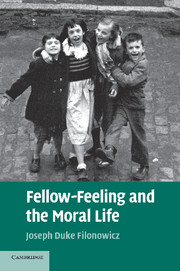Book contents
- Frontmatter
- Contents
- Preface
- Chapter 1 Fellow-feeling and ethical theory: the British sentimentalists
- Chapter 2 Ethical sentimentalism revisited
- Chapter 3 Shaftesbury's ethical system
- Chapter 4 Hutcheson's moral sense
- Chapter 5 What do we perceive by moral sense?
- Chapter 6 C. D. Broad's defense of moral sense theories in ethics
- Chapter 7 What is innate in moral sense?
- Bibliography
- Index
Chapter 6 - C. D. Broad's defense of moral sense theories in ethics
Published online by Cambridge University Press: 22 September 2009
- Frontmatter
- Contents
- Preface
- Chapter 1 Fellow-feeling and ethical theory: the British sentimentalists
- Chapter 2 Ethical sentimentalism revisited
- Chapter 3 Shaftesbury's ethical system
- Chapter 4 Hutcheson's moral sense
- Chapter 5 What do we perceive by moral sense?
- Chapter 6 C. D. Broad's defense of moral sense theories in ethics
- Chapter 7 What is innate in moral sense?
- Bibliography
- Index
Summary
“SOME REFLECTIONS”
To my knowledge, “Some Reflections on Moral Sense Theories in Ethics” is the only work in twentieth-century analytical moral philosophy that states and defends a version of moral sense theory. It is a provocative and ironic essay that is very underappreciated nowadays. I propose to revisit it in some detail, for several reasons. Most importantly I find its argument to be of extraordinary value as a coherent statement of what a modern moral sense theory might be like, and how it might be defended against (mainly rationalistic) critics who would attack or merely dismiss it. Broad shows fairness, ingenuity, humor and plain good sense in exploring what we are doing when we make ethical judgments; and despite the technicality of some of his language, his own illustrations to support moral sense theory – for example his discussion of “how we learn ethical words as children” – always seem to me to be true to what is “real, not invented or imagined.” Finally, although he mentions Hutcheson's name only once in the paper, and though his stated purpose is “to treat independently and in modern terminology some of the questions with which [Richard] Price was mainly concerned” in his A Review of the Principal Questions of Morals, I cannot help believing that he has taken many important cues from Hutcheson himself in shaping his own case.
- Type
- Chapter
- Information
- Fellow-Feeling and the Moral Life , pp. 161 - 200Publisher: Cambridge University PressPrint publication year: 2008



